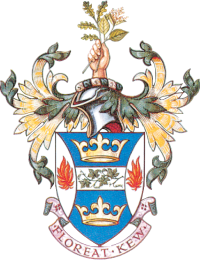Grenville 'Gren' Lucas
1935 - 2023
Image: D Pescod, The Linnean Society of London.
Born in Cardiff, Wales, in 1935, Gren’s interest in wildflowers was encouraged by his mother, a teacher, who helped him deal with what he felt was his undiagnosed dyslexia. On leaving school he was first employed as an industrial chemist working for a Distillers’ Company subsidiary, British Resin Products, which helped create the eponymous armour for the British Army’s Chobham tanks.
While attending the University of Hull, whose department of botany was headed by Professor Ronald Good, he developed an interest in plant taxonomy and phytogeography. He graduated in 1958. It was at Hull that he met his future beloved wife Shirley; they were married in Kenya during his first overseas assignment at the East African Herbarium in Nairobi, Kenya. Gren had previously worked in the herbarium of the Royal Botanic Gardens, Kew, as a research student sponsored by the Colonial Office. The preparation of the multi-author Flora of Tropical East Africa continued throughout his time at Kew, whose staff he joined on returning from Africa in 1962. The project was completed in 2011.
Gren’s field experience in Africa had heightened his commitment to plant conservation. In 1972 he was the British representative at a treaty on international trade in endangered species. He exerted much influence on how the provisions on plants, as opposed to those to do with animals, were drafted. CITES, as the Convention became known, was at the heart of Gren’s conservation activities for the decades that followed, with the UK’s CITES Scientific Authority for Plants based at Kew, and firmly under his control.
In 1974, Gren was appointed as head of a new Conservation Unit, and arranged for Kew to host the Threatened Plants Committee.
In the 1970s and ‘80s, Gren was a pioneer of global plant conservation and Kew grew to be the centre of plant He convinced and cajoled botanists to provide information on which species were in danger, and in 1978, with the assistance of Hugh Synge, the IUCN Plant Red Data Book was published. The growing team soon had a database of many thousands of at-risk species of plants from around the world.
The Unit also helped train customs officers in how to spot illegal plant imports, and it eventually became the United Nations Environment Programme World Conservation Monitoring Centre (UNEP-WCMC), based in Cambridge.
Gren also kickstarted an initiative for botanic gardens to become more involved in conservation, leading to the establishment in 1987 of Botanic Gardens Conservation International (BGCI) under the auspices of IUCN. One of the outcomes of this initiative was the innovative Kew Millennium Seed Bank at Wakehurst Place in Sussex. Throughout this time Gren was widely sought as a board member, adviser and lecturer. He was a stalwart supporter of the Council for Nature, served for two terms on the board of English Nature (now Natural England), and became a Trustee of WWF-UK.
Under his direction Kew’s publishing activities were greatly expanded. He acquired the rights to publish Curtis’s Botanical Magazine from the Royal Horticultural Society, and continued to support the house journal Kew Bulletin. Having been appointed as Keeper of the Herbarium and Library in 1984, the focus of his work shifted somewhat, and after stepping down from the Keepership in 1995, he was appointed as head of a newly created Information Services Department at Kew, embracing computer services, library, media resources and publications.
In his retirement, Gren found a new focus for his energies at the Linnean Society of London, having joined as a Fellow in 1960. Having managed Kew’s entry into the digital age, Gren now energetically pursued the aim of making the Linnean Society’s historic collections accessible online.
For his services to conservation, he was awarded an OBE in 1980, the Orde van de Gouden Ark (Order of the Golden Ark) by Prince Bernhard of the Netherlands in 1985, and the Busk Medal of the Royal Geographical Society in 1997. He received the Linnean Society’s Gold Medal in 2007, only its third recipient. The Society’s executive secretary wrote that ‘anyone who has worked with Gren knows how committed he is to the Society and how well he deserved the Award’.
Gren’s openness, drive and love for nature impacted everyone he met, and encouraged hard work or the good of the natural world. He will be sorely missed.
First published by the Linnean Society by John Edmondson FLS
(Additional information is courtesy of Hugh Synge, who died in 2018; his friendship with Gren helped inform this obituary.)
